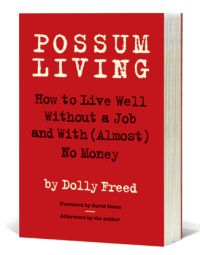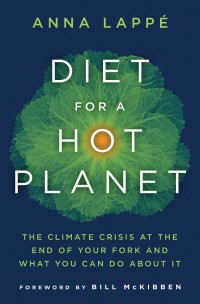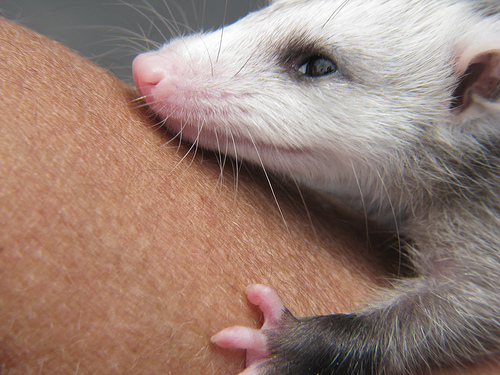Dearest readers,
 Thank you all so much for joining me this week as we got down and dirty with our first book club selection, Possum Living: How to Live Well Without a Job and With (Almost) No Money, hitting all the hot buttons like leaving the rat race, eating meat, and bucking the education system.
Thank you all so much for joining me this week as we got down and dirty with our first book club selection, Possum Living: How to Live Well Without a Job and With (Almost) No Money, hitting all the hot buttons like leaving the rat race, eating meat, and bucking the education system.
We’re in the homestretch—let’s make Dolly Freed proud with our last day of discussion. So do you think there’s something to this whole possum living thing? And if the lifestyle is as simple as Freed says it is, why aren’t more people doing it? Is it simply that we’re so culturally programmed about what’s accepted?
Has the book inspired you to make any changes in your own life? Even if you aren’t going to live a possum lifestyle, do you think there’s value in it?
Also, what was your take on the 30-years-older Freed in the afterword? Were you surprised to learn about her father’s alcoholism? Did it color your view of her story at all?
Looking forward to hearing your final thoughts.
Finally,
Umbra
P.S. It’s time to announce next month’s book club pick. (Drum roll, please.) Next up, we’ll be pouring over Anna Lappé’s Diet for a Hot Planet. We’ll kick off discussion on May 11, so get reading!
Here’s a synopsis of the book from the Small Planet Institute:
 In 1971, Frances Moore Lappé’s Diet for a Small Planet sparked a revolution in how we think about hunger, alerting millions to the hidden environmental and social impacts of our food choices. Now, nearly four decades later, her daughter, Anna Lappé, picks up the conversation. In her new book, the younger Lappé exposes another hidden cost of our food system: the climate crisis. While you may not think “global warming” when you sit down to dinner, our tangled web of global food—from Pop-Tarts packaged in Tennessee and eaten in Texas to pork chops raised in Poland, with feed from Brazil, then shipped to South Korea—is connected to as much as one third of total greenhouse-gas emissions. Livestock alone is associated with more emissions than all of the world’s transportation combined. Move over, Hummer. Say hello to the hamburger. If we’re serious about the climate crisis, says Lappé, we have to talk about food. In this groundbreaking book, Lappé exposes the interests resisting this conversation and the spin tactics companies are employing to deflect the heat. With seven principles for a climate-friendly diet and success stories from sustainable food advocates around the globe, she offers a vision of a food system that can be part of healing the planet. An engaging call to action, Diet for a Hot Planet delivers a hopeful message during troubling times.
In 1971, Frances Moore Lappé’s Diet for a Small Planet sparked a revolution in how we think about hunger, alerting millions to the hidden environmental and social impacts of our food choices. Now, nearly four decades later, her daughter, Anna Lappé, picks up the conversation. In her new book, the younger Lappé exposes another hidden cost of our food system: the climate crisis. While you may not think “global warming” when you sit down to dinner, our tangled web of global food—from Pop-Tarts packaged in Tennessee and eaten in Texas to pork chops raised in Poland, with feed from Brazil, then shipped to South Korea—is connected to as much as one third of total greenhouse-gas emissions. Livestock alone is associated with more emissions than all of the world’s transportation combined. Move over, Hummer. Say hello to the hamburger. If we’re serious about the climate crisis, says Lappé, we have to talk about food. In this groundbreaking book, Lappé exposes the interests resisting this conversation and the spin tactics companies are employing to deflect the heat. With seven principles for a climate-friendly diet and success stories from sustainable food advocates around the globe, she offers a vision of a food system that can be part of healing the planet. An engaging call to action, Diet for a Hot Planet delivers a hopeful message during troubling times.


